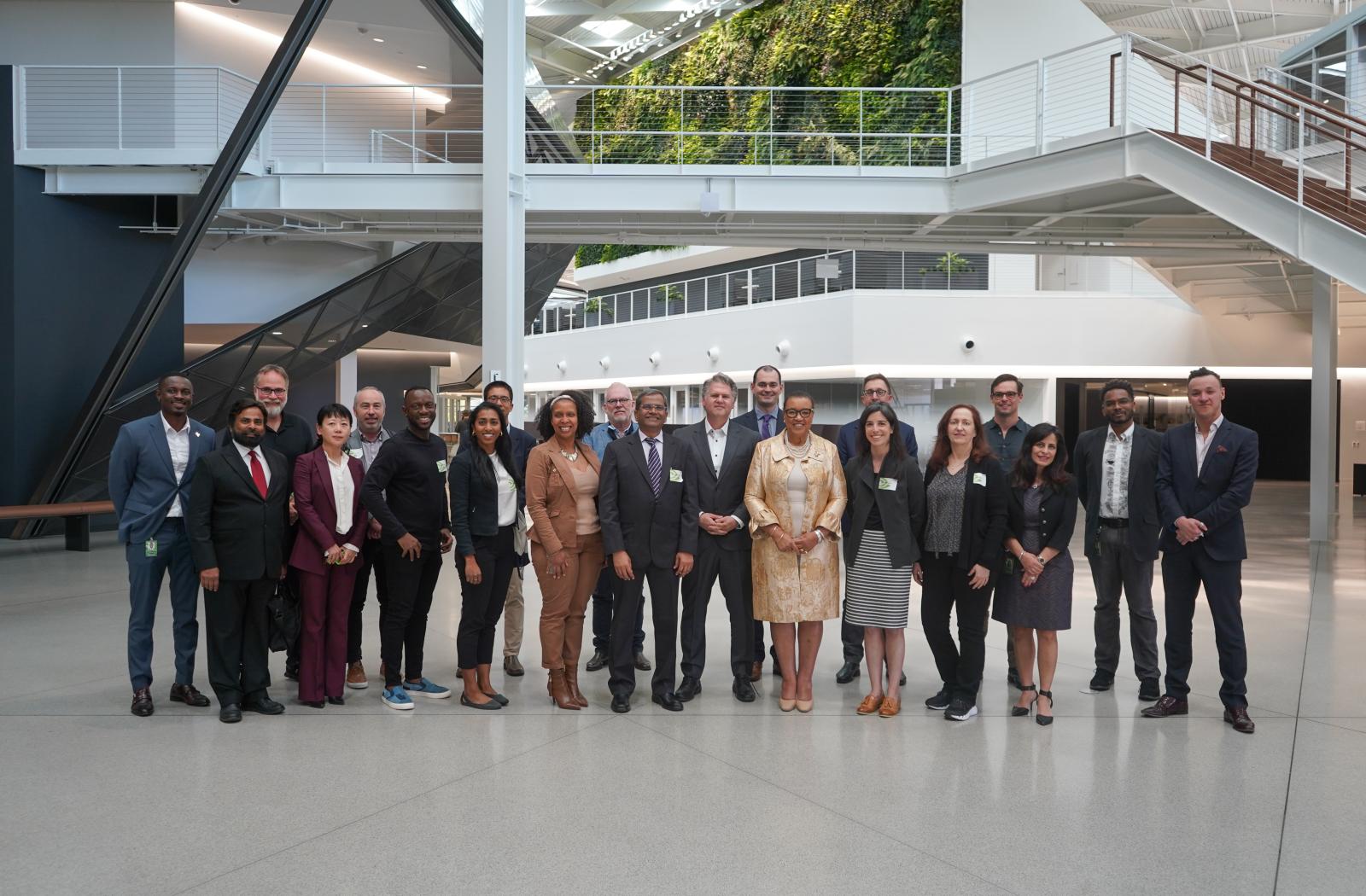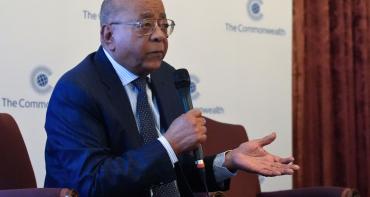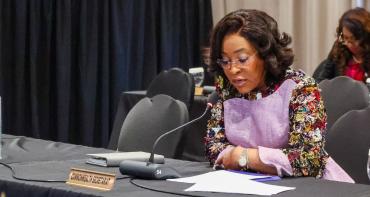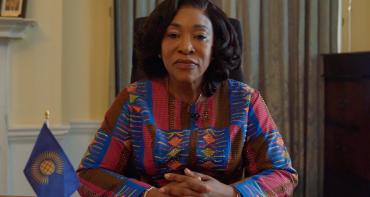The Commonwealth Secretariat, together with a consortium of global firms, start-ups, universities and non-profits, have come together to bridge the digital divide, including the artificial intelligence (AI) gap, to help empower Commonwealth citizens, with a particular focus on the association’s 33 small states.

The consortium includes world-leading organisations, such as NVIDIA, the University of California (UC) Berkeley, Microsoft, Deloitte, HP, DeepMind, Digital Catapult UK and the United Nations Satellite Centre. The consortium is also supported by Australia’s National AI Centre coordinated by the Commonwealth Scientific and Industrial Research Organisation (CSIRO), the Bank of Mauritius and Digital Affairs Malta.
At NVIDIA’s headquarters in California, Commonwealth Secretary-General, the Rt Hon Patricia Scotland KC, discussed the joint consortium on 19 April 2023, in the presence of tech experts, business leaders, policymakers, academics and civil society delegates.
Through this consortium, the Commonwealth Secretariat intends to work with industry leaders and start-ups from around the world to leverage tech innovations to make local infrastructure and supply chains stronger, reduce the impacts of climate change, make power grids greener and create new jobs that help the economy grow.
The consortium will provide support in three core areas: Commonwealth AI Framework for Sovereign AI Strategy, pan-Commonwealth digital upskilling of national workforces and Commonwealth AI Cloud for unlocking the full benefits of AI.
It aims to implement clause 103 of the mandate from the 2022 Commonwealth Heads of Government Meeting in which the Heads “reaffirmed their commitment to equipping citizens … with the skills necessary to fully benefit from innovation and opportunities in cyberspace” and “committed to ensuring inclusive access for all, eliminating discrimination in cyberspace, and adopting online safety policies for all users”.
The consortium seeks to fulfil the values and principles of the Commonwealth Charter, particularly those related to recognising the needs of small states, ensuring the importance of young people in the Commonwealth, recognising the needs of vulnerable states, promoting gender equality and advancing sustainable development.
It also contributes to the achievement of the Sustainable Development Goals (SDGs), particularly SDG 17 on partnerships, SDG 9 on industry, innovation, and infrastructure, SDG 8 on decent work and economic growth, as well as SDG 13 on climate action.
Speaking about the consortium, the Commonwealth Secretary-General said: “As the technological revolution unfolds, it is crucial that we establish sound operating frameworks to ensure AI applications are developed responsibly and are utilised to their fullest potential, all while ensuring that their benefits are more equitably distributed in accordance with the values enshrined in our Commonwealth Charter.
She added: “This consortium is a significant milestone in giving our countries the tools they need to maximise the value of advanced technologies not only for economic growth, job creation and social inclusion but also to build a smarter future for everyone, particularly for young people as the Commonwealth celebrates 2023 as the Year of Youth. We will continue to welcome strategic collaborators to join this consortium.”
Stela Solar, Director of Australia’s National AI Centre, said: “The accelerating AI landscape presents an opportunity for all – if harnessed responsibly. The Commonwealth is rich in talent and diversity that can lead the development of sustainable and equitable AI outcomes for the world. Through this collaboration, we extend CSIRO’s world-leading Responsible AI expertise and National AI Centre’s Responsible AI Network to enable Commonwealth Small States with robust and responsible AI governance frameworks.”
Harvesh Seegolam, Governor, Bank of Mauritius, stated: “As an innovation-driven organisation, the Bank of Mauritius is privileged to be part of this Commonwealth initiative which aims at helping member states reap the full benefits of AI. At a time when digitalisation of the financial sector is gaining traction worldwide, the use of AI-powered applications can take the financial system of member states to new heights and, at the same time, improve customer experience and financial inclusion while allowing for better supervision and oversight by regulators.”
André Xuereb, Ambassador for Digital Affairs, Malta, added: “Malta is proud to participate in this initiative from its inception. Small states face unique challenges as well as opportunities in deploying innovative new technologies. We look forward to sharing our experiences in creating regulatory frameworks and helping to promote the initiative throughout the small states of the Commonwealth.”
Keith Strier, Vice President of Worldwide AI Initiative at NVIDIA, added: “NVIDIA is collaborating with the Commonwealth, and its partners, to transform 33 nations into AI Nations, creating an ‘on ramp’ for AI start-ups to turbocharge emerging economies, and harnessing the public cloud to bring accelerated computing and innovations in generative AI, climate AI, energy AI, health AI, agriculture AI, and more to the Global South.”
Professor Solomon Darwin, Director, Center for Corporate Innovation, Haas School of Business, UC Berkeley, added: “This collaboration is the start of empowering the bottom of the pyramid through Open Innovation. This new approach will accelerate the creation of scalable and sustainable business models while addressing the needs of the underserved.”
Jeremy Silver, CEO, Digital Catapult, UK, said: “Digital Catapult is delighted to support the Commonwealth Secretariat, NVIDIA and its partners in this important programme. Digital Catapult is focused on developing practical approaches for early-stage companies to develop responsible AI strategies.
“We look forward to expanding our work with deep tech AI companies in the UK to reach start-ups across the Commonwealth and to promote more inclusive and responsible algorithmic design and AI practices across the small states.”
Hugh Milward, General Manager, Corporate, External, Legal Affairs at Microsoft, added: “AI is the technology that will define the coming decades with the potential to supercharge economies, create new industries and amplify human ingenuity. It’s vital that this technology brings new opportunities to all. Microsoft is proud to work with NVIDIA, the Commonwealth Secretariat and others to bring the benefits of AI to more people, in more countries, across the Commonwealth.”
Christine Ahn, Deloitte Consulting Principal, added: “Deloitte is honoured to collaborate with the Commonwealth Secretariat in their mission to close the AI divide and empower the 2.5 billion citizens of the Commonwealth. As part of this initiative, we’re excited to help build domestic AI capacity and strengthen economic and climate resilience. Our firm looks forward to providing leadership and our expertise to promote the safe and sustainable advancement of nations through AI technology.”
Tom Lue, General Counsel and Head of Governance, DeepMind, said: From tackling climate change to understanding diseases, AI is a powerful tool enabling communities to better react to, and prevent, some of society's biggest challenges. We look forward to collaborating and sharing expertise from DeepMind's diverse and interdisciplinary teams to support Commonwealth small states in furthering their knowledge, capabilities in, and deployment of responsible AI.”
Einar Bjørgo, Director, United Nations Satellite Centre (UNOSAT), added: “The United Nations Satellite Centre (UNOSAT) is pleased to collaborate with the Commonwealth Secretariat and NVIDIA in order to enhance geospatial capacities for member states, such as the use of AI for natural disaster and climate change applications.”
Jeri Culp, Director of Data Science, HP, said: “HP is working together with the Commonwealth Secretariat and its partners to advance data science and AI computing for member states. By providing advanced data science workstations, we are helping to unlock the full potential of their data and accelerate their digital transformation journey.”
Dan Travers, Co-Founder of Open Climate Fix, said: “We are delighted to be invited to be part of this AI for good project sponsored by the Commonwealth Secretariat. Our experience shows that our open-source solar forecasting platform not only lowers energy generation costs, but also delivers significant carbon reductions by reducing fossil fuel use in balancing power grids. We have designed our platform to be globally scalable, and being open source, local engineers can tailor the AI model and data inputs to their specific climates, allowing AI to act locally to have a global climate impact.”
The consortium comes at a time when AI is recognised as the dominant force in technology, providing momentum for innovative developments in industrial, business, agricultural, scientific, medical and social innovation.
In particular, generative AI services – AI programs that generate original content – are currently the fastest-growing technology, prompting many countries to increase their investment in AI technologies. In the recent past, many advanced as well as emerging economies have announced major AI initiatives.
Against this backdrop, this consortium aims to support small states in gaining access to the necessary tools to thrive in the age of AI while promoting inclusive access and safety for all users – and, through this process, addressing the further widening of the digital divide.
This collaborative approach is part of the ongoing work of the Physical Connectivity cluster of the Commonwealth Connectivity Agenda on leveraging digital infrastructure and bridging the digital divide in small states. Led by the Gambia, the cluster supports Commonwealth countries in implementing the Agreed Principles on Sustainable Investment in Digital Infrastructure.
Media contact
- Snober Abbasi Senior Communications Officer, Communications Division, Commonwealth Secretariat
- T: +442077476168 | E-mail



